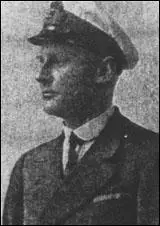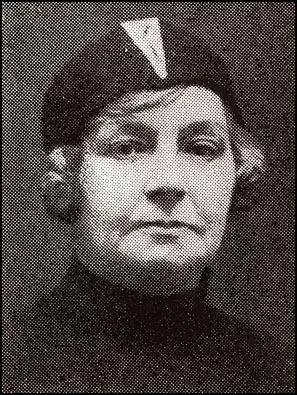Charles Edward Hudson

Charles Edward Hudson was born in 1874. He joined the British Navy and reached the rank of Lieutenant-Commander. (1)
In 1907 Major Vernon Kell become Director of the Home Section of the Secret Service Bureau with responsibility for investigating espionage, sabotage and subversion within and without Britain. (2)
In 1911, a new section, headed by Captain Mansfield Cumming, became responsible for for secret operations outside Britain. In 1916 he appointed Hudson as the Copenhagen bureau chief. He used the cover of being a passport control officer. (3)
After retiring from British Naval Intelligence he married Alma Derrington Bell. The couple moved to Arnen, Limmer Lane, Felpham. Over the next few years Alma gave birth to three children. (4) In 1921 he was a founder member of the British Legion, a charity providing financial, social and emotional support to members and veterans of the British Armed Forces, their families and dependants. (5) Hudson had a senior post for the Dunlop Rubber Company. A member of the Conservative Party he became a local councillor and Vice Chairman of Felpham Council. (6)
Charles Edward Hudson & British Union of Fascists
At an election meeting in Broadwater on 16th October 1933, Charles Bentinck Budd revealed he had recently met Sir Oswald Mosley and had been convinced by his political arguments and was now a member of the British Union of Fascists (BUF). Budd added that if he was elected to the local council "you will probably see me walking about in a black shirt". (7)
Budd won the contest and the national press reported that Worthing was the first town in the country to elect a Fascist councillor. Worthing was now described as the "Munich of the South". Mosley now announced that Budd was the BUF Administration Officer for Sussex. Budd also caused uproar by wearing his black shirt to council meetings. (8)
On 4th January, 1934, Budd reported that over 150 people in Worthing had joined the British Union of Fascists. Some of the new members were former communists but the greatest intake had come from increasingly disaffected Conservatives. The Weekly Fascist News described the growth in membership as "phenomenal" as a few months ago members could be counted on one's fingers, and now "hundreds of young men and women -.together with the many leading citizens of the town - now participated in its activities". (9)
Oswald Mosley attracted large and enthusiastic audiences to his meetings. He devoted a high proportion of his time to speeches in market towns in agricultural counties where he "tapped into the traditional conservatism of a farming community" which had been suffering from intractable economic problems since the end of the First World War. His 1933 campaign pulled in several disgruntled farmers and ex-Conservatives including Jorian Jenks, Viscountess Dorothy Downe, Richard Reynell Bellamy, Ronald N. Creasy and Robert Saunders. (10)
Charles Hudson joined the British Union of Fascists in 1934. According to his daughter he was recruited by John Sidney Crosland, a young man from Rustington. "In the early 1930's my father was already in his 60's when they met, John in his 20's... John was an enthusiastic Mosleyite and persuaded my father join and eventually became Leader for Sussex." Hudson also became the BUF's parliamentary candidate in Chichester. (11)
Anglo-German Fellowship
Hudson also joined the Anglo-German Fellowship (AGF). It was formed following a speech by Prince of Wales that called for a closer understanding of Germany in order to safeguard peace in Europe. Sir Thomas Moore, the Conservative Party MP, responded by suggested setting up a study group of pro-German MPs. It was then decided to open it up to those outside the House of Commons and the AGF was established in September 1935 with Wilfrid Ashley (Lord Mount Temple), the former government minister, as chairman and historian Philip Conwell-Evans and merchant banker Ernest Tennant as secretaries. (12)
The Anglo-German Fellowship was aimed, above all, at the rich and powerful. It proudly and publicly claimed among its members, fifty members of both Houses of Parliament, three directors of the Bank of England, and "many generals, admirals, bishops and bankers". It also had a close relationship with several important Nazi leaders. This included Joachim von Ribbentrop, Rudolf Hess and General Werner von Blomberg. The pro-Nazi press baron, Harold Harmsworth, 1st Lord Rothermere, arranged for Ernest Tennant, the leader of AGF, to meet Adolf Hitler, Konstantin von Neurath, Joseph Goebbels, and Hermann Goering. (13)
District Leader
Hudson became the most important Fascists in Sussex. A MI5 report stated: "Throughout the country the movement was well organized, led by enthusiastic persons and persistently active until the time the principal members were arrested... The Chief Constable estimated the number of adherents in Bognor as about 300.... Worthing membership was estimated to be about 60...As to the amount of activity, we know that the area was of sufficient importance of Mosley himself to speak at four meetings in recent times." (14)
During the 1930s, many visitors were invited to have dinner with the Hudson family, this included Oswald Mosley, William Joyce, Jorian Jenks and Charles Bentinck Budd. Alma Hudson became the Women's District Leader for Bognor Regis. Her sister, Doreen Bell, was one of the organization's national speakers and was married to Archibald Findlay, the BUF's Director of Public Relations. (15)
Hudson's daughter later commented: "In 1934 my father joined the British Union of Fascists, and my mother followed, with my father soon becoming leader in Sussex, as well as a parliamentary candidate. My siblings - a sister, brother and I aged ten, nine and seven respectively, joined in the excitement. Oswald Mosley came to dinner, we painted slogans on street walls, raised our arms in Nazi salute, shouted PJ (perish the Jews), and sang Giovinezza - an Italian Fascist song." (16)
Hudson also worked closely with Norah Elam, a former leading figure in the Women's Social and Political Union (WSPU), who living in Northchapel, near Chichester, who had been appointed as BUF County Women's Officer for West Sussex. In November, 1935, Hudson and Elam arranged for John Beckett to make a speech in Northchapel explaining why the BUF was not taking part in the 1935 General Election. Hudson then led a march of around 100 Blackshirts under the banner, "Fascism Next Time." (17)

A secret police report on Fascism in Sussex claimed that "Commander Hudson... was the leading man in West Sussex, although he was energetically supported by a number of able subordinates. Working in close co-operation with him as Regional Inspector of the whole of Sussex was J.S.G. Crosland... The Chief Constable estimated the number of adherents in Bognor as about 300." (18)
The police report recorded that Hudson was one of the most important BUF speakers in Sussex. On Sunday, 20th February, 1938, Hudson and Mosley both spoke at the Theatre Royal in Bognor Regis. In a speech made at the British Legion, he supported the appeasement policies of Neville Chamberlain as he thought Britain should do everything in order to avoid war: "Today we are hearing the drums of war. They are beating throughout Europe... How can our people forget the millions of men who sacrificed their lives in the last war? Those men who today are resting under the poppies of Flanders through to us the torch which we were to carry and to live up to for their great sacrifice." (19)
In April 1939 Hudson shared a platform with Jorian Jenks in Bognor Regis to explain how the British Union of Fascists planned "to construct a self-sufficient economic unit" in agriculture. "Jenks explained how the Fascist plan of an agricultural corporation to manage the industry, and to be representative of the industry from the farmer and the farm labourer to the housewife and the consumer, was expected to achieve the economic price and the assured market." (20)
The British Union of Fascists had developed a reputation for racism. Mosley had adopted a long-term electoral strategy of supporting anti-Semitic campaigns in Jewish areas. Jewish hecklers at Fascist meetings had been badly beaten up. The two men were both questioned about the Fascist attitude to the Jews, and Jenks argued "the Jews were aliens to this country, and as guests, were expected to achieve the standard of behaviour set up in this country". If they failed to do this "they would be deported". (21)
Internment
The Second World War began on 3rd September, 1939. The following year Winston Churchill became prime minister, and warned that a German invasion was imminent and announced the imposition of Defence Regulation 18B. This legislation, passed on 22nd May, 1940, gave the Home Secretary the right to imprison without trial anybody he believed likely to "endanger the safety of the realm". Over the next few weeks 1,769 British subjects were interned of whom 763 had been members of the British Union of Fascists. (22)
Of the fascists British fascists arrested over 600 came from Sussex. (23) This included Charles and Alma Hudson. John Sidney Crosland, Charles Bentinck Budd, and Norah Elam were also arrested. A government report pointed out: "The internment of the persons whose cases have come before the Committee or whose cases are sent herewith has done much to stamp out Fascist activity in West Sussex, but it is evident that there are still fascist sympathizers and that the return of any of their Leaders might well cause a recrudescence of their activities." (24)
This was a very difficult time for the Hudson family. Their daughter commented, "both my parents were interned under Regulation 18B – my mother on 30 May and my father two weeks later. He spent three and a half years on the Isle of Man, whilst my mother had nine months in Holloway, with neither of them ever being charged. In the meantime we children had stones thrown at us and felt orphaned." (25) Hudson continued to have authority in the British Union of Fascists and while at the Huyton Internment Camp he was elected as Camp Leader. (26)
Charles Edward Hudson died in 1948.
Primary Sources
(1) Diana Bailey, The Parkes Institute for the Study of Jewish/Non-Jewish Relations (2012)
I am a convent-educated Roman Catholic. My father, Charles Edward Hudson, was fifty-four when I was born. An ex-naval Commander and ex founder member of MI6, he also served as British Consul in Copenhagen. My mother Alma Violet Derrington Hudson, then twenty-four came from Worcestershire, and had been taught to sign by Elgar. A straight-forward British family, you might think.
In 1934 my father joined the British Union of Fascists, and my mother followed, with my father soon becoming leader in Sussex, as well as a parliamentary candidate. My siblings - a sister, brother and I aged ten, nine and seven respectively, joined in the excitement.
Oswald Mosley came to dinner, we painted slogans on street walls, raised our arms in Nazi salute, shouted PJ (perish the Jews), and sang Giovinezza - an Italian Fascist song.
When war came in 1939 both my parents were interned under Regulation 18B – my mother on 30 May and my father two weeks later. He spent three and a half years on the Isle of Man, whilst my mother had nine months in Holloway, with neither of them ever being charged. In the meantime we children had stones thrown at us and felt orphaned.
